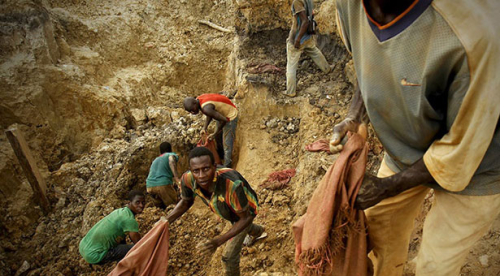Bothered by the prevalence of mercury due mainly to Artisanal and Small Scale Gold Mining (ASGM) activities, Nigeria is to develop a National Action Plan (NAP) for the sector.

This appears to be a fall-out from the “Minamata Convention Initial Assessment (MIA) in Nigeria”, a project which, among other functions, conducted a preliminary inventory of mercury releases in the country.
Inventory results showed that ASGM processing is significant, thereby prompting the development of a NAP for the ASGM sector.
Proposed and approved by Global Environment Facility (GEF), the project’s objective is to improve national capacity and capability for the management of mercury. Implementation arrangement has been finalised, with the United Nations Industrial Development Organisation (UNIDO) as the implementing agency.
Making the disclosure recently in Abuja at the inception workshop on the NAP on mercury use in the Nigerian ASGM sector project, Environment Minister of State, Ibrahim Usman Jibril, disclosed that the components of the NAP are in accordance to Annex C of the Minamata Convention on Mercury, adding that project implementation commenced with the inauguration of a National Steering Group (NSG) recently. The NSG, he added, would be responsible for providing guidance and technical support to the executing agencies for effective implementation of the project activities.
The workshop participants, who deliberated on the best approaches to formalise the ASGM sector in Nigeria, as well as available mercury-free alternatives for ASGM activities, noted that, while holders of exploration licenses lease out to illegal miners, ASGM miners lack operational equipment and funds to facilitate operations.
They also underlined the fact that while enforcement of laws and policies in the ASGM sector is weak, informal miners in the ASGM sector engage in unhealthy practices including continued use of mercury.
To formalise ASGM sector in Nigeria, the participants want government to:
- Take appropriate steps to control and eventually eliminate illegal mining,
- Provide security for ASGM workers,
- Have functional cooperative societies,
- Provide access to capital and fund mining activities and facilitate provision of appropriate equipment,
- Facilitate the establishment of gold buying centres across the country,
- Engage in establishing a strategic gold reserve, and source products only from licensed mines,
- Educate law enforcement agents and security agents on enforcement of mining laws,
- Sensitise ASGM miners and host communities.
The workshop also mentioned the following mercury-free alternatives:
- Borax – however it is not available yet for use in Nigeria,
- Igoli machine – not yet in use also because the needed chemicals are not available and the miners are not trained yet for its use,
- Traditional panning methods and the sluicing method,
- Use of retort capture method for fugitive emissions from the mines during burning processing.
The Minamata Convention on Mercury is a new international environmental convention for global community to work collaboratively against mercury pollution. The Minamata Convention aims at achieving environmentally sound mercury management throughout its life cycle. The Convention was adopted at the diplomatic conferences held in Minamata City and Kumamoto City in October 2013.
Having achieved the required 50 ratifications, the Convention came into force on Thursday, May 18, 2017. Consequently, the Convention, which aims at protecting human health and the environment from anthropogenic emissions and releases of mercury and mercury compounds, will become legally binding for all its Parties on Wednesday, August 16, 2017.
The 1st Conference of the Parties to the Minamata Convention (COP1) will gather governments, intergovernmental and non-governmental organisations from around the world in Geneva from September 24 to 29, 2017.
Nigeria is yet to ratify the Convention.
